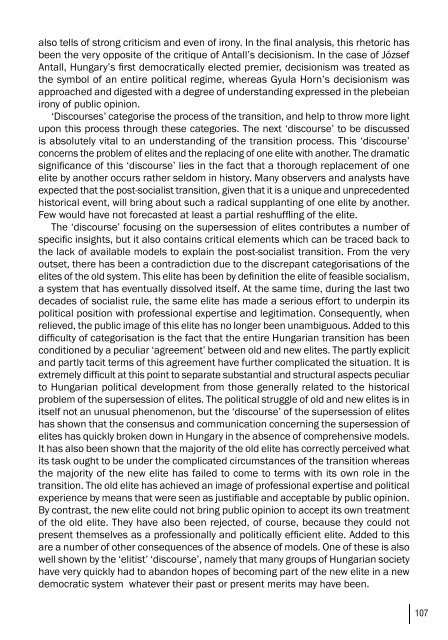art-e-conomy _ reader - marko stamenkovic
art-e-conomy _ reader - marko stamenkovic
art-e-conomy _ reader - marko stamenkovic
You also want an ePaper? Increase the reach of your titles
YUMPU automatically turns print PDFs into web optimized ePapers that Google loves.
also tells of strong criticism and even of irony. In the final analysis, this rhetoric has<br />
been the very opposite of the critique of Antall’s decisionism. In the case of József<br />
Antall, Hungary’s first democratically elected premier, decisionism was treated as<br />
the symbol of an entire political regime, whereas Gyula Horn’s decisionism was<br />
approached and digested with a degree of understanding expressed in the plebeian<br />
irony of public opinion.<br />
‘Discourses’ categorise the process of the transition, and help to throw more light<br />
upon this process through these categories. The next ‘discourse’ to be discussed<br />
is absolutely vital to an understanding of the transition process. This ‘discourse’<br />
concerns the problem of elites and the replacing of one elite with another. The dramatic<br />
significance of this ‘discourse’ lies in the fact that a thorough replacement of one<br />
elite by another occurs rather seldom in history. Many observers and analysts have<br />
expected that the post-socialist transition, given that it is a unique and unprecedented<br />
historical event, will bring about such a radical supplanting of one elite by another.<br />
Few would have not forecasted at least a p<strong>art</strong>ial reshuffling of the elite.<br />
The ‘discourse’ focusing on the supersession of elites contributes a number of<br />
specific insights, but it also contains critical elements which can be traced back to<br />
the lack of available models to explain the post-socialist transition. From the very<br />
outset, there has been a contradiction due to the discrepant categorisations of the<br />
elites of the old system. This elite has been by definition the elite of feasible socialism,<br />
a system that has eventually dissolved itself. At the same time, during the last two<br />
decades of socialist rule, the same elite has made a serious effort to underpin its<br />
political position with professional expertise and legitimation. Consequently, when<br />
relieved, the public image of this elite has no longer been unambiguous. Added to this<br />
difficulty of categorisation is the fact that the entire Hungarian transition has been<br />
conditioned by a peculiar ‘agreement’ between old and new elites. The p<strong>art</strong>ly explicit<br />
and p<strong>art</strong>ly tacit terms of this agreement have further complicated the situation. It is<br />
extremely difficult at this point to separate substantial and structural aspects peculiar<br />
to Hungarian political development from those generally related to the historical<br />
problem of the supersession of elites. The political struggle of old and new elites is in<br />
itself not an unusual phenomenon, but the ‘discourse’ of the supersession of elites<br />
has shown that the consensus and communication concerning the supersession of<br />
elites has quickly broken down in Hungary in the absence of comprehensive models.<br />
It has also been shown that the majority of the old elite has correctly perceived what<br />
its task ought to be under the complicated circumstances of the transition whereas<br />
the majority of the new elite has failed to come to terms with its own role in the<br />
transition. The old elite has achieved an image of professional expertise and political<br />
experience by means that were seen as justifiable and acceptable by public opinion.<br />
By contrast, the new elite could not bring public opinion to accept its own treatment<br />
of the old elite. They have also been rejected, of course, because they could not<br />
present themselves as a professionally and politically efficient elite. Added to this<br />
are a number of other consequences of the absence of models. One of these is also<br />
well shown by the ‘elitist’ ‘discourse’, namely that many groups of Hungarian society<br />
have very quickly had to abandon hopes of becoming p<strong>art</strong> of the new elite in a new<br />
democratic system whatever their past or present merits may have been.<br />
107


